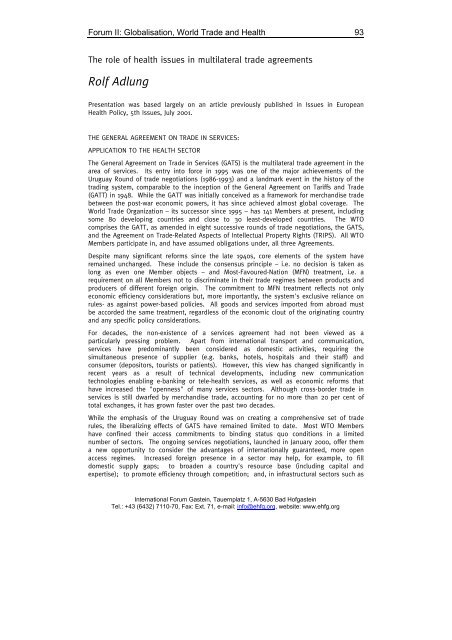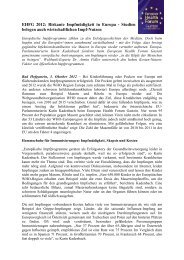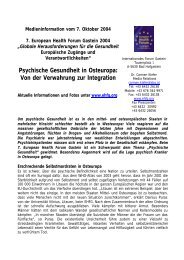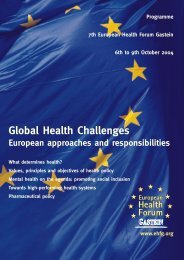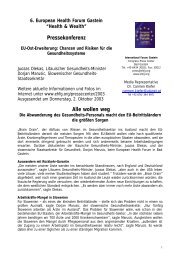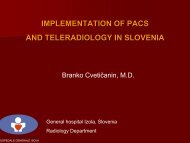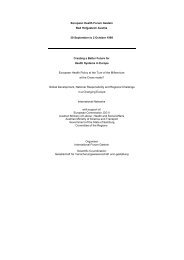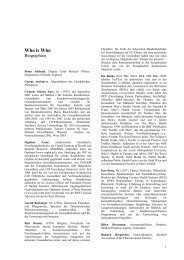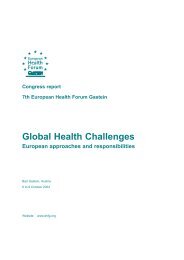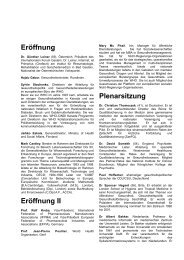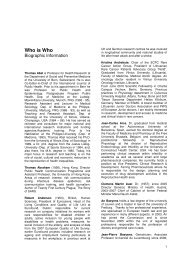Congress report - European Health Forum Gastein
Congress report - European Health Forum Gastein
Congress report - European Health Forum Gastein
Create successful ePaper yourself
Turn your PDF publications into a flip-book with our unique Google optimized e-Paper software.
<strong>Forum</strong> II: Globalisation, World Trade and <strong>Health</strong><br />
The role of health issues in multilateral trade agreements<br />
Rolf Adlung<br />
Presentation was based largely on an article previously published in Issues in <strong>European</strong><br />
<strong>Health</strong> Policy, 5th Issues, July 2001.<br />
THE GENERAL AGREEMENT ON TRADE IN SERVICES:<br />
APPLICATION TO THE HEALTH SECTOR<br />
The General Agreement on Trade in Services (GATS) is the multilateral trade agreement in the<br />
area of services. Its entry into force in 1995 was one of the major achievements of the<br />
Uruguay Round of trade negotiations (1986-1993) and a landmark event in the history of the<br />
trading system, comparable to the inception of the General Agreement on Tariffs and Trade<br />
(GATT) in 1948. While the GATT was initially conceived as a framework for merchandise trade<br />
between the post-war economic powers, it has since achieved almost global coverage. The<br />
World Trade Organization – its successor since 1995 – has 141 Members at present, including<br />
some 80 developing countries and close to 30 least-developed countries. The WTO<br />
comprises the GATT, as amended in eight successive rounds of trade negotiations, the GATS,<br />
and the Agreement on Trade-Related Aspects of Intellectual Property Rights (TRIPS). All WTO<br />
Members participate in, and have assumed obligations under, all three Agreements.<br />
Despite many significant reforms since the late 1940s, core elements of the system have<br />
remained unchanged. These include the consensus principle – i.e. no decision is taken as<br />
long as even one Member objects – and Most-Favoured-Nation (MFN) treatment, i.e. a<br />
requirement on all Members not to discriminate in their trade regimes between products and<br />
producers of different foreign origin. The commitment to MFN treatment reflects not only<br />
economic efficiency considerations but, more importantly, the system's exclusive reliance on<br />
rules- as against power-based policies. All goods and services imported from abroad must<br />
be accorded the same treatment, regardless of the economic clout of the originating country<br />
and any specific policy considerations.<br />
For decades, the non-existence of a services agreement had not been viewed as a<br />
particularly pressing problem. Apart from international transport and communication,<br />
services have predominantly been considered as domestic activities, requiring the<br />
simultaneous presence of supplier (e.g. banks, hotels, hospitals and their staff) and<br />
consumer (depositors, tourists or patients). However, this view has changed significantly in<br />
recent years as a result of technical developments, including new communication<br />
technologies enabling e-banking or tele-health services, as well as economic reforms that<br />
have increased the "openness" of many services sectors. Although cross-border trade in<br />
services is still dwarfed by merchandise trade, accounting for no more than 20 per cent of<br />
total exchanges, it has grown faster over the past two decades.<br />
While the emphasis of the Uruguay Round was on creating a comprehensive set of trade<br />
rules, the liberalizing effects of GATS have remained limited to date. Most WTO Members<br />
have confined their access commitments to binding status quo conditions in a limited<br />
number of sectors. The ongoing services negotiations, launched in January 2000, offer them<br />
a new opportunity to consider the advantages of internationally guaranteed, more open<br />
access regimes. Increased foreign presence in a sector may help, for example, to fill<br />
domestic supply gaps; to broaden a country's resource base (including capital and<br />
expertise); to promote efficiency through competition; and, in infrastructural sectors such as<br />
International <strong>Forum</strong> <strong>Gastein</strong>, Tauernplatz 1, A-5630 Bad Hofgastein<br />
Tel.: +43 (6432) 7110-70, Fax: Ext. 71, e-mail: info@ehfg.org, website: www.ehfg.org<br />
93


